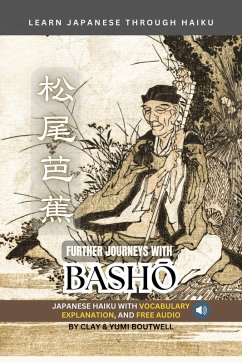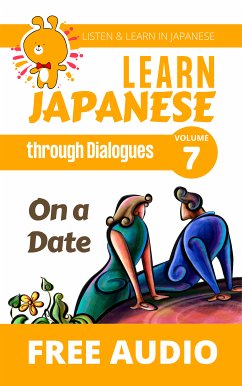
Learn Japanese through Haiku - Masaoka Shiki (eBook, ePUB)
Enjoy Japanese culture while building your vocabulary and grammar

PAYBACK Punkte
0 °P sammeln!
Enjoy and Fully Understand 20 haiku by ¿¿¿¿ (Masaoka Shiki) (1867-1902)Haiku fascinates people worldwide-so much emotion and meaning can be conveyed with so few words. Yet, few outside of Japan can truly appreciate Japanese haiku in its original form. Even Basho, the most celebrated classical Japanese haiku poet, is typically only accessible through translation. While good translations can capture the essence of the words, the nuances and cultural aspects are often lost.This book is designed to help beginner to intermediate students of Japanese learn vocabulary and grammar while uncovering...
Enjoy and Fully Understand 20 haiku by ¿¿¿¿ (Masaoka Shiki) (1867-1902)
Haiku fascinates people worldwide-so much emotion and meaning can be conveyed with so few words. Yet, few outside of Japan can truly appreciate Japanese haiku in its original form. Even Basho, the most celebrated classical Japanese haiku poet, is typically only accessible through translation. While good translations can capture the essence of the words, the nuances and cultural aspects are often lost.
This book is designed to help beginner to intermediate students of Japanese learn vocabulary and grammar while uncovering some of the subtle meanings that are lost in translation.
The collection features twenty haiku, presented in both Japanese and English, with QR codes that allow you to instantly hear recordings of the poems by simply scanning them with your phone. Each haiku is followed by a short commentary in both languages, along with a comprehensive vocabulary list that includes definitions and grammatical notes for all the Japanese terms. In this new edition, we've added even more commentary and provided multiple translations for each haiku, ranging from literal to figurative interpretations.
At the end of the book, you'll find a download link to access all the sound files, complementing the QR codes.
What You'll Get:
Read and understand twenty of Masaoka Shiki's most famous haiku.
Perfect for beginner to intermediate students of Japanese.
Downloadable sound files for all the haiku in Japanese and the commentary.
Definitions for every word, along with explanations of key grammar points and haiku elements.
Every haiku and commentary include a QR code for instant access to audio recordings.
Newly updated and expanded with a modern design, enriched vocabulary lists, and more translations and commentary.
¿¿(¿¿¿¿)¿¿(¿¿) (Masaoka Shiki) (1867-1902) was a Japanese poet, essayist, and literary critic, best known for his work in revitalizing traditional Japanese poetry forms such as ¿¿(¿¿¿) (haiku) and ¿¿(¿¿¿) (tanka) during the Meiji period. Born in Matsuyama, Ehime Prefecture, his birth name was Masaoka Tsunenori (¿¿(¿¿¿¿) ¿(¿¿)¿(¿¿)), but he later adopted the pen name "Shiki ¿¿(¿¿)," which means "cuckoo." According to legend, the cuckoo is said to cough up blood when it sings, a poignant symbol for Shiki, who suffered from tuberculosis for much of his life. Despite living only 34 short years, Shiki is credited with writing nearly 20,000 haiku. Many consider him one of the four great haiku masters, alongside Matsuo Basho, Yosa Buson, and Kobayashi Issa.
Ready to improve your Japanese while deepening your cultural knowledge?
Haiku fascinates people worldwide-so much emotion and meaning can be conveyed with so few words. Yet, few outside of Japan can truly appreciate Japanese haiku in its original form. Even Basho, the most celebrated classical Japanese haiku poet, is typically only accessible through translation. While good translations can capture the essence of the words, the nuances and cultural aspects are often lost.
This book is designed to help beginner to intermediate students of Japanese learn vocabulary and grammar while uncovering some of the subtle meanings that are lost in translation.
The collection features twenty haiku, presented in both Japanese and English, with QR codes that allow you to instantly hear recordings of the poems by simply scanning them with your phone. Each haiku is followed by a short commentary in both languages, along with a comprehensive vocabulary list that includes definitions and grammatical notes for all the Japanese terms. In this new edition, we've added even more commentary and provided multiple translations for each haiku, ranging from literal to figurative interpretations.
At the end of the book, you'll find a download link to access all the sound files, complementing the QR codes.
What You'll Get:
Read and understand twenty of Masaoka Shiki's most famous haiku.
Perfect for beginner to intermediate students of Japanese.
Downloadable sound files for all the haiku in Japanese and the commentary.
Definitions for every word, along with explanations of key grammar points and haiku elements.
Every haiku and commentary include a QR code for instant access to audio recordings.
Newly updated and expanded with a modern design, enriched vocabulary lists, and more translations and commentary.
¿¿(¿¿¿¿)¿¿(¿¿) (Masaoka Shiki) (1867-1902) was a Japanese poet, essayist, and literary critic, best known for his work in revitalizing traditional Japanese poetry forms such as ¿¿(¿¿¿) (haiku) and ¿¿(¿¿¿) (tanka) during the Meiji period. Born in Matsuyama, Ehime Prefecture, his birth name was Masaoka Tsunenori (¿¿(¿¿¿¿) ¿(¿¿)¿(¿¿)), but he later adopted the pen name "Shiki ¿¿(¿¿)," which means "cuckoo." According to legend, the cuckoo is said to cough up blood when it sings, a poignant symbol for Shiki, who suffered from tuberculosis for much of his life. Despite living only 34 short years, Shiki is credited with writing nearly 20,000 haiku. Many consider him one of the four great haiku masters, alongside Matsuo Basho, Yosa Buson, and Kobayashi Issa.
Ready to improve your Japanese while deepening your cultural knowledge?
Dieser Download kann aus rechtlichen Gründen nur mit Rechnungsadresse in A, B, BG, CY, CZ, D, DK, EW, E, FIN, F, GR, H, IRL, I, LT, L, LR, M, NL, PL, P, R, S, SLO, SK ausgeliefert werden.













